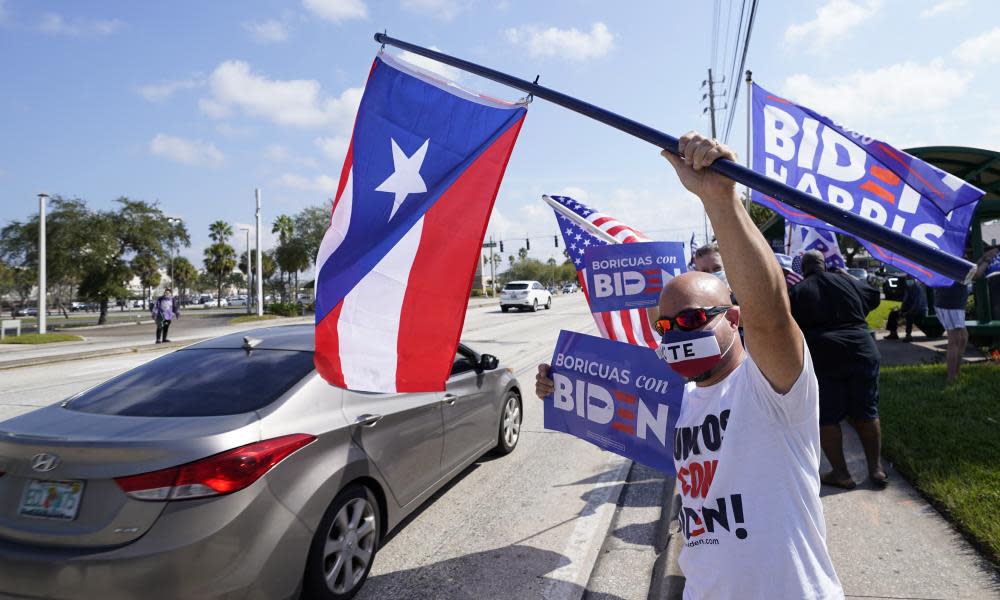Latinos the targets of election disinformation – but activists are fighting back

Messages that paint Joe Biden as a socialist spreading among conservative Latinos from Cuba and Venezuela. Conspiracy theories on YouTube about Barack Obama in Spanish. Billboards and posters falsely claiming that voting by mail is illegal in Texas.
Related: Florida accused of sowing confusion with last-minute voting changes
Ahead of election day, Latinos are seeing not just more political ads but also plenty of disinformation.
“We usually see this kind of information disorder in locations with a large Latinx population, such as Miami, Houston or Los Angeles,” said Daniel Acosta Ramos, an investigative researcher at the non-profit First Draft.
Disinformation as a means of causing confusion, doubt and fear around voting is nothing new during campaigns, but social media make it easier to generate and spread. Latinos in particular are targets because they are a critical voting bloc, especially in battlegrounds such as Florida, Arizona and Texas.
In Florida, 20% of eligible voters in 2018 were Hispanic, nearly double the share in 2000, according to Pew Research. In Arizona, Hispanics accounted for 24% of all eligible voters in 2018. Latinos are also politically diverse – for example, Cuban Americans tend to vote Republican, while Puerto Ricans lean Democrat – so dissuading voting in Latino communities, even subtly, could tip an election.
There are several types of digital voting disinformation, such as giving the wrong time, place or manner of voting, according to democracy watchdog Common Cause. And during Covid-19, when normal routines are disrupted, online disinformation tactics are “much more believable and have a greater impact today than any other election cycle”, said Jesse Littlewood, vice-president at Common Cause, in a webinar.
That has real-world effects. In Arizona, early voting began early this month and “there has already been the feeling of intimidation at the polls when Trump supporters show up at the same time,” said Hector Sanchez Barba, chief executive of Mi Familia Vota, the Latino civic engagement non-profit.
Instances of intimidating Latino voters are fueled by false but divisive disinformation that undocumented immigrants are voting illegally. There are also false narratives about vote rigging, conspiracy theories or intimidation, such as telling people immigration authorities will patrol polling stations.
US representatives Debbie Mucarsel-Powell of Florida and Joaquín Castro of Texas in September asked the FBI to investigate disinformation targeting Latinos in Florida. Their letter noted a surge in social media posts with “false or misleading information”, as well as disinformation ads in mainstream newspapers and radio.
It cited an insert in El Nuevo Herald, a Spanish-language publication of the Miami Herald, that “equated Black Lives Matter protesters with Nazis”. A Florida radio station aired views that a victory by Biden “would mean that the US would fall into a dictatorship led by Jews and Blacks”.
Civic and advocacy groups are fighting back. The non-profit Voto Latino encourages its young audience to relay correct information to older relatives who may not have the language or internet skills to find reliable sources. It has also trained its staff to spot online disinformation and report it to the watchdog group Disinfo Defense League. One Voto Latino Instagram post refuted inaccurate statistics about Covid-19 deaths with an explicit FALSE stamp across the image.
“One person empowered and motivated to counter misinformation can have a huge impact in their personal networks,” said Danny Turkel, communications manager at Voto Latino. Turkel has heard feedback from young people such as: “‘My abuelita said this and I knew it was wrong. Then I showed her something from Voto Latino.’”
Meanwhile, despite the disinformation tactics, there are already signs of strong Latino voter turnout. Voto Latino alone has registered more than 500,000 voters since mid-2019. That’s more than total registrations since the organization was founded in 2004.
And Way to Win, a non-profit progressive coalition, noted that there are already “huge levels” of early voting with people sending back ballots. “People are very motivated to vote,” said Jenifer Fernandez Ancona, vice-president at Way to Win.
For many outreach efforts, the best way to cut through the disinformation, and reach voters is to focus on relationships. Latinos tend to be more receptive when information comes from trusted local and known sources – such as community organizations, relatives and church leaders.
Information from personal contacts is especially important because WhatsApp is popular in Latino communities, even though it is a hotbed for misinformation because its encrypted messages can’t be easily tracked.
“The person they want to hear from is a neighbour, pastor, the guy they went to high school with,” said Kristian Ramos, a Democratic strategist with Autonomous Strategies. “They want to know: ‘Are you from my community? Are you from here? Can I trust you?’”


